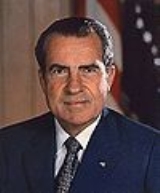
Richard Nixon
Richard Milhous Nixon was the 37th President of the United States, serving from 1969 to 1974. The only president to resign the office, Nixon had previously served as a US representative and senator from California and as the 36th Vice President of the United States from 1953 to 1961 under President Dwight D...
Timeline of Events
|
1952
|
|
|||||||||||
|
1958
|
|
|||||||||||
|
1959
|
|
|||||||||||
|
1968
|
|
|||||||||||
|
1969
|
|
|||||||||||
|
1970
|
|
|||||||||||
|
1971
|
|
|||||||||||
|
1972
|
|
|||||||||||
|
1973
|
|
|||||||||||
|
1974
|
|

